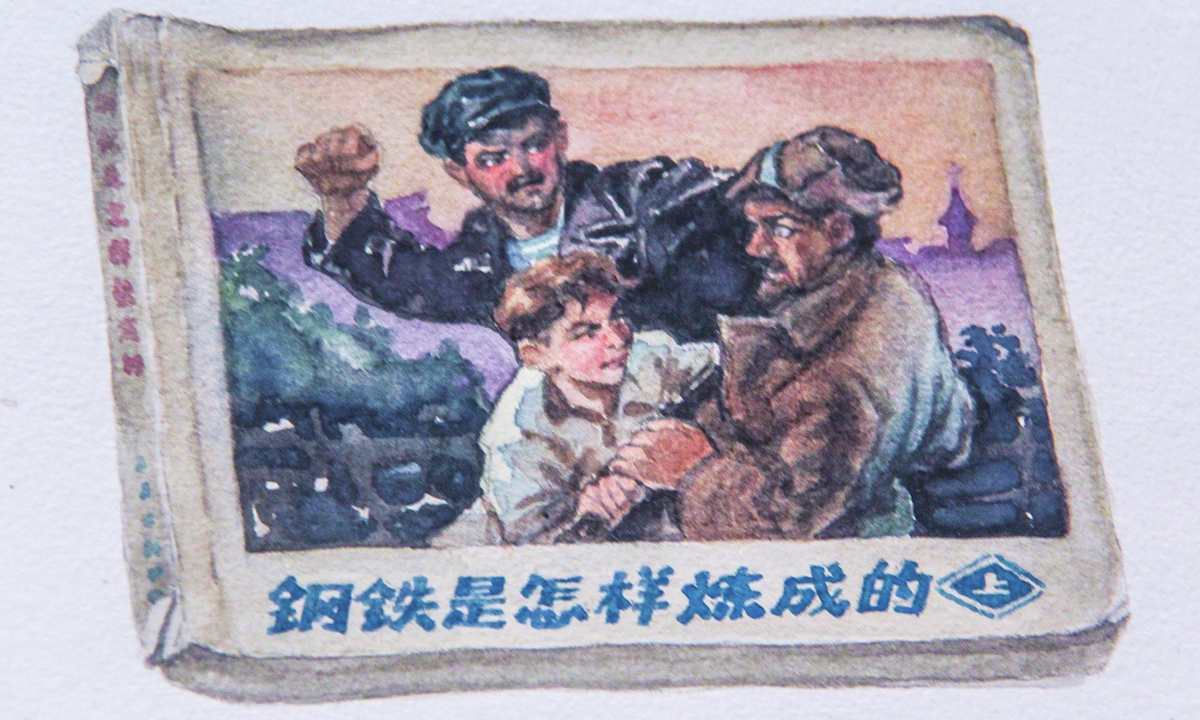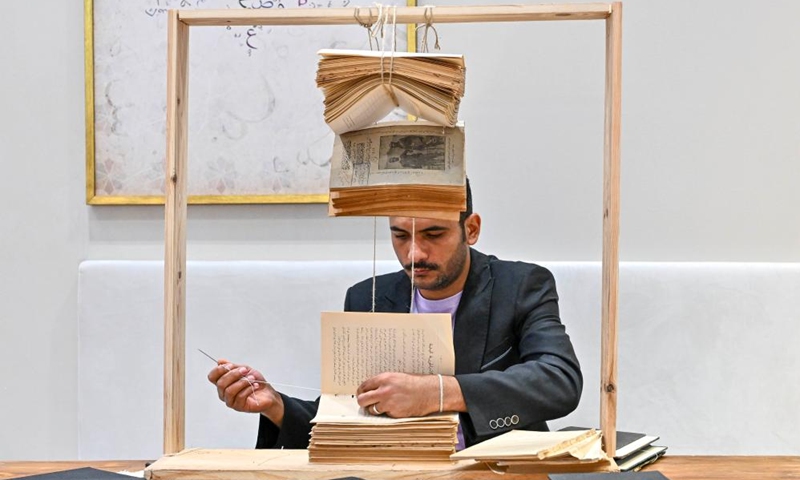MY READING LIFE / STUDENTS' WORKS
‘How the Steel was Tempered’ gifts me with tenacity and courage
Good spirit
Editor's Note:
"Read ten thousand books, and your pen will be guided as if by the gods" is an ancient Chinese idiom that can be seen in students' textbooks. China's Ministry of Education has published an action plan to further promote reading among students across the nation. With new and diverse book recommendations, the reading scene is expected to be revived not only at schools, but also across society. To contribute to this endeavor, the Global Times launched "My Reading Life" essay contest for middle school students.
Please pick up a pen and share your stories with us at reading@globaltimes.com.cn
Participants will be rewarded once the article has been selected.

I am deeply inspired by these sentences, which remind me of a book that I love so much. The book is titled How the Steel was Tempered by Nikolai Ostrovsky, and is truly a classic that has sold around 36.4 million copies worldwide.
The book follows the story of a main character called Pavel Korchagin. Pavel is a child who was born in a poor family. When he was very young, he was forced to go to work in a restaurant.
Year after year, he saw his workmates have misfortune and he also battled with mean people.
He was disappointed with the darkness of the society, but he didn't know how to alter it. After he grew up, he worked in a factory and met a marine. Pavel learned a lot of knowledge about revolution from him, and he was determined to fight for it. As time went by, he fell in love with Tonya, the native forest officer's daughter, and they had a pleasant time for a few years.
But he needed to leave for his plan and dream, so he left his love, and ran for further and higher goals. He became a soldier. In the war, he fought bravely, and he actively spread the hope of winning and the great achievements heroes made. He was injured in a huge war, and from that time, illness went with him for the rest of his life.
Although he couldn't join wars anymore, he kept fighting in different places for revolution. Even though he came close to death numerous times, he never stopped trying and working. In the end, his health became worse. He couldn't go to work, but he used his pen to write and created some poems about revolution. He also taught his wife.
While reading this, I was deeply touched. Pavel's life was suitable for the saying: "If life doesn't stop, the persistence won't stop." In his mind, revolution was not only a goal, but also a hope, and a mission that he was willing to keep working toward despite bearing great pain.

Nowadays, many young people choose to stay at home and depend on others' help. They have fun every day and do not think their lives are wasted by their choice. I think it's a worthless thing when human lives are hopeless and do not have a strong goal. If people live like that, they aren't any different than a pig or a chicken.
In fact, even a chicken has its own mission: lay eggs and have a walk around the farm. You may find it intriguing: Can that be a mission? In a human view it is certainly not, but for a chicken it obviously is. We should carefully consider: Even animals have goals and missions, can't we do better? Like Pavel did?
Thinking of my own life, I thought a lifetime goal was far away from myself and hard work only made me tired. However, when I thought about Pavel's life, especially when he was near death, he didn't feel sorry about his life as he didn't do anything bad, so he had a full life at last.
After thinking about this, I feel sorry for the way I was thinking. I am determined that in the future, I wouldn't let setbacks stop me.
The author is a student at Beijing Wenhui Middle School
"Read ten thousand books, and your pen will be guided as if by the gods" is an ancient Chinese idiom that can be seen in students' textbooks. China's Ministry of Education has published an action plan to further promote reading among students across the nation. With new and diverse book recommendations, the reading scene is expected to be revived not only at schools, but also across society. To contribute to this endeavor, the Global Times launched "My Reading Life" essay contest for middle school students.
Please pick up a pen and share your stories with us at reading@globaltimes.com.cn
Participants will be rewarded once the article has been selected.

An illustration book of the novel How the Steel was Tempered in Chinese Photo: IC
"Although someone died, he is alive. Someone is alive now, but he has already died." These words were carefully selected by a deeply respected Chinese poet as a heartfelt tribute to the esteemed writer Lu Xun.I am deeply inspired by these sentences, which remind me of a book that I love so much. The book is titled How the Steel was Tempered by Nikolai Ostrovsky, and is truly a classic that has sold around 36.4 million copies worldwide.
The book follows the story of a main character called Pavel Korchagin. Pavel is a child who was born in a poor family. When he was very young, he was forced to go to work in a restaurant.
Year after year, he saw his workmates have misfortune and he also battled with mean people.
He was disappointed with the darkness of the society, but he didn't know how to alter it. After he grew up, he worked in a factory and met a marine. Pavel learned a lot of knowledge about revolution from him, and he was determined to fight for it. As time went by, he fell in love with Tonya, the native forest officer's daughter, and they had a pleasant time for a few years.
But he needed to leave for his plan and dream, so he left his love, and ran for further and higher goals. He became a soldier. In the war, he fought bravely, and he actively spread the hope of winning and the great achievements heroes made. He was injured in a huge war, and from that time, illness went with him for the rest of his life.
Although he couldn't join wars anymore, he kept fighting in different places for revolution. Even though he came close to death numerous times, he never stopped trying and working. In the end, his health became worse. He couldn't go to work, but he used his pen to write and created some poems about revolution. He also taught his wife.
While reading this, I was deeply touched. Pavel's life was suitable for the saying: "If life doesn't stop, the persistence won't stop." In his mind, revolution was not only a goal, but also a hope, and a mission that he was willing to keep working toward despite bearing great pain.

Photo:IC
Perhaps, this book wasn't created to promote revolution, but to tell us that tempering steel needs not only the heat of hope, but also experience and trying day by day. People should not only have high aims, but also have a way to achieve them and a strong mind to keep fighting for them.Nowadays, many young people choose to stay at home and depend on others' help. They have fun every day and do not think their lives are wasted by their choice. I think it's a worthless thing when human lives are hopeless and do not have a strong goal. If people live like that, they aren't any different than a pig or a chicken.
In fact, even a chicken has its own mission: lay eggs and have a walk around the farm. You may find it intriguing: Can that be a mission? In a human view it is certainly not, but for a chicken it obviously is. We should carefully consider: Even animals have goals and missions, can't we do better? Like Pavel did?
Thinking of my own life, I thought a lifetime goal was far away from myself and hard work only made me tired. However, when I thought about Pavel's life, especially when he was near death, he didn't feel sorry about his life as he didn't do anything bad, so he had a full life at last.
After thinking about this, I feel sorry for the way I was thinking. I am determined that in the future, I wouldn't let setbacks stop me.
The author is a student at Beijing Wenhui Middle School



